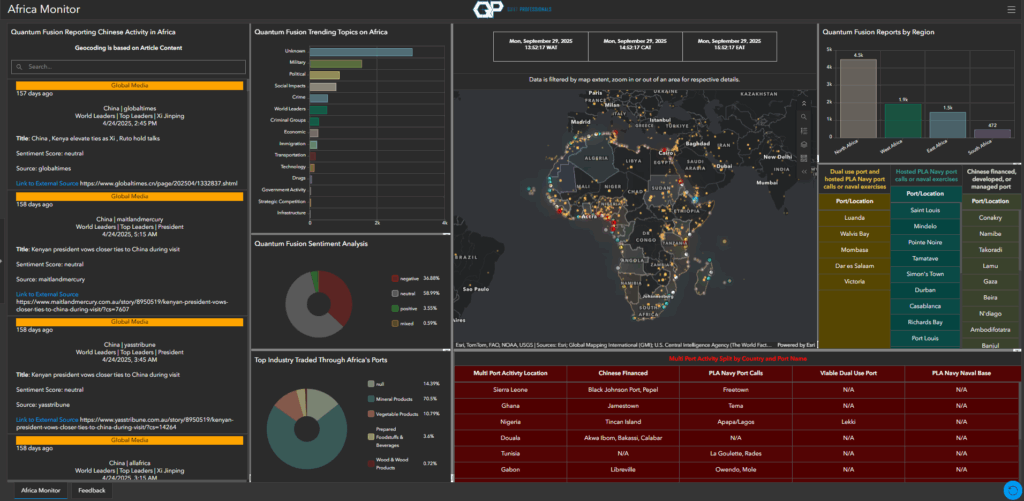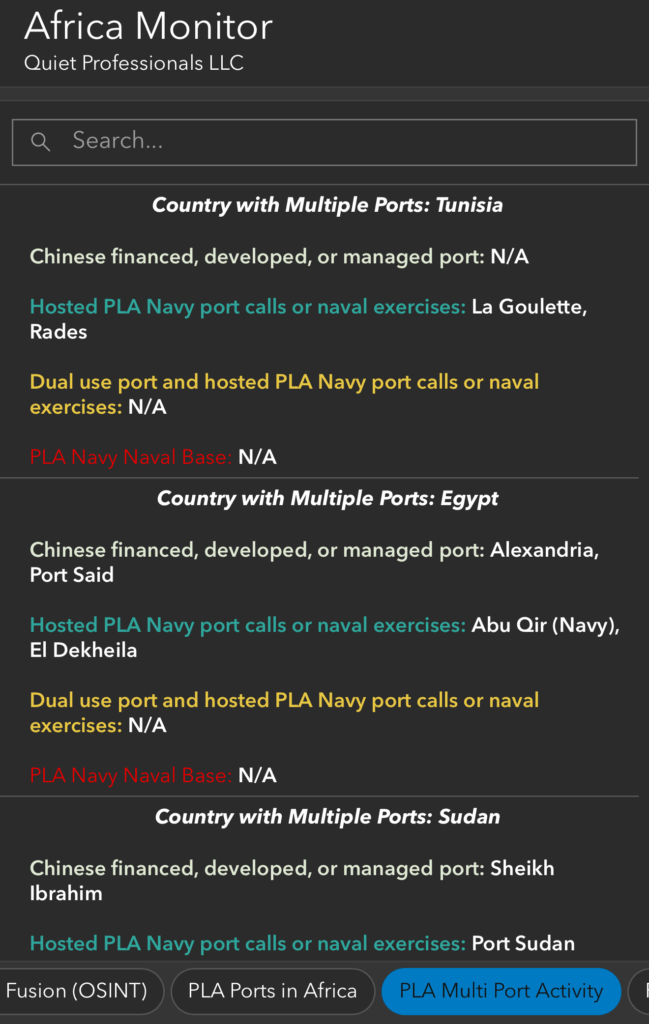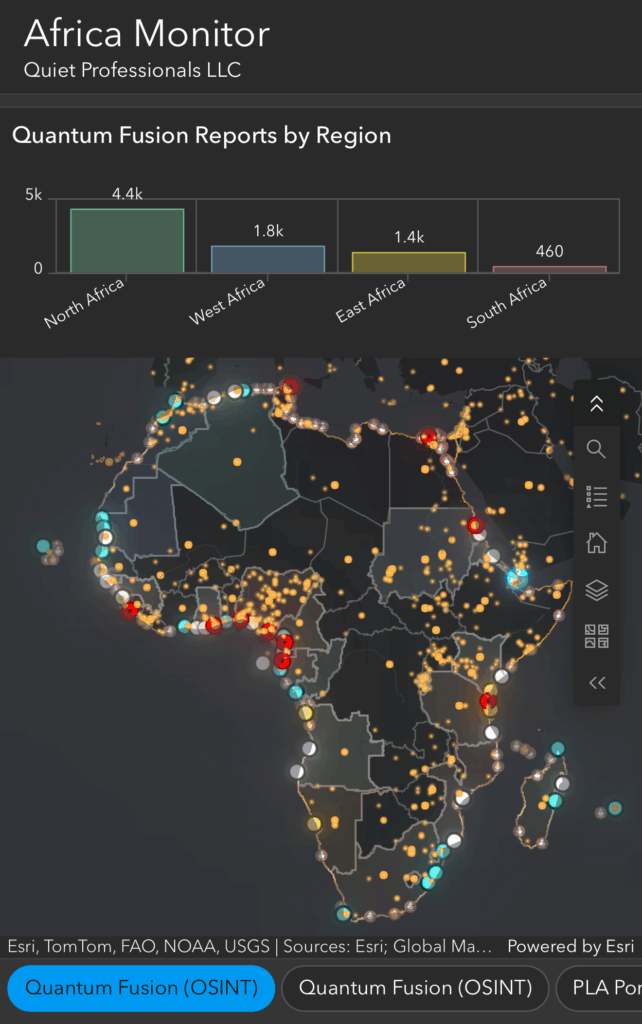Using OSINT to Analyze Chinese Activity in Africa
As China deepens its economic, political, and military involvement across the African continent, understanding the scope and strategic nature of this engagement is critical. From port development and quantum-secure communications to expanded trade partnerships and potential military basing, the evolving relationship between China and African nations carries far-reaching implications for regional security, sovereignty, and global influence.
This OSINT summary provides a consolidated view of recent developments—paired with the Africa Monitor Dashboard, built on Quiet Professionals’ Signals GIS platform. The dashboard visualizes open-source reporting to help users monitor activity, assess influence, and identify trends as they develop.
Dashboard Screenshots



OSINT Summary:
China is significantly expanding its influence in Africa across several sectors, including trade, infrastructure, and military presence. Recently, the UK agreed to transfer sovereignty of the Chagos Islands to Mauritius, which potentially increases China’s influence in the region. Meanwhile, the piracy of a Chinese fishing vessel off the coast of Ghana indicates China’s activity in Africa’s maritime sector. China’s economic footprint on the continent also continues to grow, with notable developments such as a deal between Saudi Arabia’s Jameel Motors and China-based Changan Automobiles to distribute cars in South Africa. Additionally, China has established a quantum-secure communication link with South Africa, advancing its goal of creating a global quantum communication network.
China’s strategic investments in African ports are especially concerning for some, as Chinese firms are involved in over a third of Africa’s maritime trade hubs, with many fearing that commercial ports might be repurposed for military use, as seen in Djibouti. The growing military presence and the potential for Chinese military bases in Africa, including possible future sites in Angola, Kenya, and other locations, raise sovereignty and security concerns.
Reports:
The reporting below is summarized. Full article links can be found in the sources section.
1. X User: @Visegrad24
BREAKING The British PM’s office says Trump has approved the UK’s decision to hand over sovereignty of Chagos, incl. the strategic UK/US military base on Diego Garcia, to the China-allied country of Mauritius in exchange for a 99-year lease Chagos has been British for 211 years.
2. China Says Fishing Boat Crew is Safe After Piracy Incident Off Ghana
Ghana’s Navy is investigating a suspected piracy attack on a commercial fishing vessel, the Mengxin 1, off the coast of Ghana. The incident occurred on March 27, when seven armed pirates boarded the vessel and held the crew at gunpoint. After firing warning shots and forcing some crew members into hiding, the pirates stole mobile phones and left after three hours. The vessel’s captain, chief mate, and chief engineer, all Chinese nationals, were reported missing, but Chinese officials later confirmed that all crew members were safe. The pirates’ location remains unknown, but the Ghanaian Navy has launched a search and alerted neighboring countries. This attack follows a similar piracy incident in November 2024 involving a Chinese fishing vessel off the Horn of Africa.
3. Saudi Arabia’s Jameel Motors Has Signed a Deal to Distribute China-Based Changan Automobiles and New EVs in South Africa
Saudi Arabia’s Jameel Motors has signed a deal to distribute China-based Changan Automobile’s SUVs, sedans, pickups and new energy vehicles in South Africa, the companies announced on Monday, their first foray into the country.
4. What to Expect from Africa-China Relations in 2025
In 2025, African countries aim to recalibrate their strategic partnerships with China to better serve their interests. China’s Foreign Minister, Wang Yi, visited several African nations to strengthen ties, focusing on areas like mineral supply chains, maritime cooperation, and infrastructure. While China’s Africa policy, through the FOCAC Beijing Action Plan, promotes industrialization and security cooperation, African nations are pushing for more balanced relationships, including improved market access, reduced trade imbalances, and value-added exports.
African leaders also seek more control over Chinese-funded projects and greater transparency. As China expands its military and educational initiatives in Africa, concerns about its governance model’s influence grow. Africa is increasingly fostering independent expert networks to ensure its interests are represented, aiming to align Chinese initiatives with Africa’s development goals like Agenda 2063. In short, African nations are looking for a more mutually beneficial partnership with China.
5. Are China and Russia on a Collision Course in Africa
In Africa, China and Russia are expanding their influence, but their approaches differ significantly. China focuses on long-term investments and stability to secure its growing economic interests, with trade between China and Africa reaching $295 billion in 2024. Its Belt and Road Initiative (BRI) has led to significant infrastructure developments across the continent. In contrast, Russia, particularly through the Wagner Group, thrives in unstable environments, providing military support to regimes in countries like Mali, the Central African Republic (CAR), and Sudan, where insecurity is prevalent.
Although their strategies often diverge, Russia’s destabilizing actions have sometimes benefited China by pushing anti-Western sentiments and reducing Western influence. However, areas of competition are emerging, especially in arms sales and access to vital minerals. China controls a significant portion of Africa’s copper and cobalt production, and its investments in conflict-prone regions, like the Democratic Republic of Congo, could clash with Russia’s support for instability.
A potential flashpoint is Ivory Coast, where Russian influence could disrupt China’s economic ties. Additionally, Russia’s actions could strain China’s investments, especially if security challenges in African nations increase. While Russia’s involvement may help China weaken Western presence, it also risks creating instability that could undermine China’s economic goals. In response, China might eventually adopt Russia’s approach, utilizing mercenaries to protect its operations while still benefiting from Russia’s influence in countering the West.
6. China in Africa: February 2025
In February 2025, China and South Africa strengthened their diplomatic ties during key events. South Africa hosted the G20 Foreign Ministers’ Meeting in Johannesburg, with China’s Foreign Minister Wang Yi emphasizing solidarity and support for developing countries. China’s investments in South Africa are growing, with trade totaling $52.5 billion in 2024, and continued cooperation in areas like disaster reduction and energy transition.
Economic diplomacy was a major theme across Africa, with China continuing to play a pivotal role in trade and infrastructure. Several African nations, including Nigeria, Egypt, and Kenya, highlighted China’s contributions to industrial development and green energy initiatives, like a $7.9 billion green hydrogen project in Nigeria. China also supported South Africa’s solar energy efforts through a trilateral partnership.
In the realm of military integration, North African nations such as Morocco, Egypt, and Algeria sought Chinese military equipment to modernize their forces, moving away from traditional Western suppliers. This included drones, fighter jets, and naval corvettes.
The Chagos Islands issue continues to stir debate. The UK has agreed to cede the islands to Mauritius but retained control over Diego Garcia, a strategically important base. Some fear that the deal could allow China to gain insight into U.S.-UK activities, raising security concerns, especially about China’s potential presence in the region.
7. China Establishes Quantum-Secure Communication Links with South Africa
China has achieved a major milestone in quantum communication by establishing a secure quantum key distribution (QKD) link between Beijing and South Africa, marking its first ultra-secure communication connection in the southern hemisphere. This achievement, enabled by China’s quantum communication satellites, is part of China’s broader effort to create an intercontinental communication network resistant to hacking. The demonstration covered a distance of 12,800 kilometers and aligns with China’s ambition to launch a global quantum communication service by 2027.
China’s quantum communication advancements are built on the Quantum Experiments at Space Scale (QUESS) project, which includes the Mozi (Micius) satellite. This project has already facilitated secure communication between China and Austria, as well as between China and Russia. Quantum communication uses principles of quantum mechanics, making eavesdropping detectable through quantum key distribution, thus ensuring high levels of security.
China aims to build a global quantum communication network, focusing on secure links with BRICS nations. The country is investing heavily in quantum information science and plans to complete a quantum satellite constellation by 2027. Despite progress, challenges remain in scaling up QKD technology for broader use, including cost and infrastructure integration.
8. Mapping China’s Strategic Port Development in Africa
Chinese firms are deeply involved in African port developments, with Chinese state-owned companies active in 78 ports across 32 African countries, making up over a third of Africa’s maritime trade hubs. This presence is concentrated primarily in West Africa, where 35 of the 78 ports are located. Chinese firms control port operations, financing, and construction, often taking large financial stakes in these projects, like the Lekki Deep Sea Port in Nigeria. Through these operations, China benefits economically, gaining trade revenues and influencing port access and operations, raising concerns about sovereignty and security.
There are worries that commercial ports could be repurposed for military use, as seen with China’s military base at Doraleh Port in Djibouti. This has sparked fears that similar bases might be established elsewhere in Africa, expanding China’s military footprint. Chinese port development aligns with its broader strategic goals outlined in the Five-Year Plans and Belt and Road Initiative, positioning Africa as a critical part of China’s global ambitions.
China’s strategic port investments also support its military objectives, with the People’s Liberation Army (PLA) Navy having conducted port calls and exercises at several African ports. Some ports, like those in Angola, Djibouti, and Kenya, are considered likely candidates for future Chinese military use due to their design features and strategic locations. This expansion raises concerns among African nations about being pulled into China’s geopolitical rivalries and the increasing militarization of Africa. The development of these ports has implications for sovereignty, national security, and the region’s alignment with global powers, requiring careful scrutiny from African governments.
All data referenced in this report is open-source and publicly available. The Africa Monitor Dashboard demonstrates how open-source intelligence—when properly fused, filtered, and visualized—can reveal the bigger picture.
Imagine the insights your team could unlock by applying this same methodology to your own data.
We invite you to explore the Africa Monitor Dashboard, engage with the data, and share your feedback to help guide future enhancements.
Sources
- X; Military Base; released on 01 APR 2025; https://x.com/visegrad24/status/1907075586461188587
- ICSF; China Says Fishing Boat Crew is Safe After Piracy Incident Off Ghana; released on 01 APR 2025; https://icsf.net/newss/china-says-fishing-boat-crew-is-safe-after-piracy-incident-off-ghana/
- Reuters; Saudi Arabia’s Jameel Motors Has Signed a Deal to Distribute China-Based Changan Automobiles and New EVs in South Africa; 31 MAR 2025; https://x.com/Reuters/status/1906894337155170527
- Africa Center; Africa-China Relations 2025; released on 07 JAN 2025; https://africacenter.org/spotlight/africa-china-relations-2025/
- Foreign Policy; Are China and Russia on a Collision Course in Africa; released on 31 MAR 2025; https://foreignpolicy.com/2025/03/31/china-russia-wagner-security-stability-africa/
- Council on Foreign Relations; China in Africa: February 2025; released on 01 APR 2025; https://www.cfr.org/article/china-africa-february-2025
- Quantum Insider; China Establishes Quantum-Secure Communication Links with South Africa; released on 14 MAR 2025; https://thequantuminsider.com/2025/03/14/china-established-quantum-secure-communication-links-with-south-africa/
- Africa Center; Mapping China’s Strategic Port Development in Africa; released on 10 MAR 2025; https://africacenter.org/spotlight/china-port-development-africa/